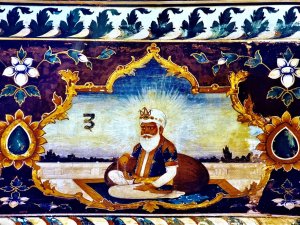Prayer for Humility
 In the world we are trained to learn and become something in life. In the process we have coined many terms to describe those abilities - confident, competent, self-motivated, high self-esteem, and go- getter etc. Those who are not showered with these epithets are not valued in the society as successful. Interestingly, the education system, and society encourage these qualities but when these overgrow, they are labelled as pride, narcissistic tendencies, vanity, chutzpah etc. The prayer for humility will only spring out of the heart that has realized one's own shortcomings and limitations. So, now we can see that there is a dichotomy between what education system and society is teaching and what Guru Ji want us to become. When one realizes that there is nothing that he can be really truly proud of, and then one has imbibed humility.
In the world we are trained to learn and become something in life. In the process we have coined many terms to describe those abilities - confident, competent, self-motivated, high self-esteem, and go- getter etc. Those who are not showered with these epithets are not valued in the society as successful. Interestingly, the education system, and society encourage these qualities but when these overgrow, they are labelled as pride, narcissistic tendencies, vanity, chutzpah etc. The prayer for humility will only spring out of the heart that has realized one's own shortcomings and limitations. So, now we can see that there is a dichotomy between what education system and society is teaching and what Guru Ji want us to become. When one realizes that there is nothing that he can be really truly proud of, and then one has imbibed humility.
Thus by making us the dust of the feet or insignificant; Guru Ji is trying to elevate us into a person of prominence. Guru Nanak Dev Ji has not left us wondering or searching for words but has shared with us the words of prayer. These words are not just a beautiful prayer but reflect an ornate, poetic and artistic penmanship. Guru Ji says:
"jyqw smuMdu swgru nIir BirAw qyqy Aaugx hmwry ]dieAw krhu ikCu imhr aupwvhu fubdy pQr qwry ]"
"Jeta samund sagar neer bhariaa thaethae aougun humaarae. Dayaa karahu kichh mehar oupaavahu dubadhae pathhar taarae." (SGGS, Pg. No. 156)
Meaning: (Just) As seas and oceans are brimming with water, so I am filled with shortcomings. Please, shower me with Your Mercy, and take pity upon me. I am a sinking stone - please carry me across.
These words show us what true humility is. There is no external display of power, position, ego or pride in spite of teaming with those qualities. Guru Ram Das Ji has expressed similar views by showing us how to pray with these words:
"hm grIb mskIn pRB qyry hir rwKu rwKu vf vfw hy ]"
"Hum gareeb maskeen parbh taerae har raakh raakh vad vaddaa hae." (SGGS, Pg. No. 13)
Meaning: Oh God! I am poor and meek, but I am yours! Save me, please save me, O Greatest of the Great.
These prayers are from the heart and reflect a desire, in fact a keen desire to be accepted and be blessed. The attitude of the learner and the seeker has infinite possibilities to explore and learn, but for a learned Pundit the door of possibilities is closed. Just as a house with closed doors and windows emits stale stench, but when doors and windows are opened fresh air ventilates through the house. Same way a person with high opinion of self has closed himself to new ideas and fresh perspectives. Because he has fixated his mind on the position he has taken based on his knowledge. His effort is to win accolades for his achievement, scholarship and to bask in that glory. He has locked himself with that position and is unwilling to open up or explore. The learner or the Sikh has no such preconceived notion and has opened all the doors of possibilities. He is willing to ask, experiment, learn and to improve thus becoming better. This is the attitude that keeps the seeker firmly planted in the earth, and the mind keeps growing up to heavens. This attitude brings out the flower of beauty and a sweet fruit that is beneficial to mankind. This state of mind has been depicted in Gurbani in these words:
"miq hodI hoie ieAwxw ] qwx hody hoie inqwxw ] Axhody Awpu vMfwey ] ko AYsw Bgqu sdwey ]"
"Muth hodhee hoe eiaanaa. Taan hodhae hoe nithaanaa. Anehodhae aap va(n)ddaaeae. Ko aisaa bhagath sadhaaeae." (SGGS, Pg. No.1384)
Meaning: If you are wise, be unpretentious; if you are powerful, be humble; and when there is nothing to share, then share your share with others. How rare is one who lives (like this) is known as a devotee.
With this frame of mind the seeker prays and counsels the mind with these words:
"mn ijau Apuny pRB Bwvau ] nIchu nIcu nIcu Aiq nwn@w hoie grIbu bulwvau ]"
"Mun jio apunae prabh bhaavo. neechahu neech neech ath naanhaa hoe gareeb bulaavo." (SGGS, Pg. No. 529)
Meaning: O my mind, act (in a manner) that it pleases God. Become the lowest of the low, the very least of the tiny, and pray in utmost humility.
Thus, we can see that Guru Ji is telling us to become the humblest of the humble and ask for God's grace in the prayer. In fact the bard Bhaatt Keerat's prayer for humility to Guru Ram Das Ji is great example of true prayer for humility. He prays:
"hm Avguix Bry eyku guxu nwhI AMimRqu Cwif ibKY ibKu KweI ]
mwXw moh Brm pY BUly suq dwrw isau pRIiq lgweI ]
ieku auqm pMQu suinE gur sMgiq iqh imlµq jm qRws imtweI ]
iek Ardwis Bwt kIriq kI gur rwmdws rwKhu srxweI ]"
"Hum avagun bharae aek gun naahee amrit shhaadd bikhai bikh khaaee. Maya moh bharam pai bhoolae suth dhaaraa sio preet lagaaee. Ik uttam panth suniou gur sangat thih milanth jam taraas mittaaee. Ik aradhaas bhaatt keerath kee gur raamadaas raakhahu saranaaee."(SGGS, Pg. No.1406)
Meaning: I am overflowing with sins and demerits; I have no merits or virtues at all. I abandoned the Ambrosial Nectar, and I drank poison instead. I am attached to Maya, and deluded by doubt; I have fallen in love with my children and spouse. I have heard that the most exalted Path of all is the Sangat, the Guru's Congregation. Joining it, the fear of death is taken away. Keerat the poet offers this one prayer: O Guru Raam Daas! Save me! Take me into Your Sanctuary!
How Bhaatt opens his heart in full humility and admits not only to his lack of virtues, but also an attachment to perishable world, doubts, double mindedness, attachment to spouse and children etc. He says that we forsake the exalted path and opt for the path where doom in the end is inevitable. Therefore Bhaatt prays to Guru Ram Das and seeks the sanctuary of the Guru, thus freeing the self from the fear of death. It is not surprising that the prescribed Sikh prayer has similar words in a form of prayer for humility:
"isKW dw mn nIvwN, mq ayucI, mq pq dw rwKw Awip vwihgurU["
"Sikhaa da mun neevaa, mut uchee, mut pat daa rakhaa aap Waheguru."
Meaning: May the minds of all Sikhs remain humble, and their wisdom exalted. O God! You are the protector of wisdom.
The beauty of the words is really beyond description. One can only reflect on it and admire it. The seeker can be drenched in the admiration process, and can feel the surge of humility within. If we carefully look at the sentence the beauty is that it is not just the prayer for humility but along with it higher understanding is also being prayed for. In addition there is an acknowledgement that You (God) are the protector of wisdom or higher understanding. Why? Because, a feeling of having obtained the higher understanding; can also create a subtle pride. So, in one sentence the prayer for higher understanding is sandwiched with a prayer for humility on one side and acknowledgement that the higher understanding is only acquired with your grace and protection. Otherwise it will be lost in the flood of pride that could swell in the mind with the acquisition of higher understanding.
Guru Nanak Dev Ji always preached about acquiring humility and still remaining humble with childlike innocence. Guru Ji sited the example of water of the fountain. The water that came from the greatest depths always soars to the highest point. Therefore Guru Ji always emphasised the significance of water flowing downwards as a metaphor for humility.
Now, let us try to get a little better depth of the higher understanding. It really is a clear understanding that the life, property, wealth, position, and fame are all perishable. There is only one thing that is not perishable, and that is love, reverence, and remembrance of God. This non-perishable accompanies one in this world and the world after. The lower understanding is the understanding of the material world. The higher understanding is of that which does not perish. It is empowering making us firm like a rock, while the lower understanding produces a wavering, doubting, and a vacillating mind. It is precisely for this reason Guru Arjan Dev Ji has declared that those who consider themselves humble are the truly exalted.
"Awps kau jo jwxY nIcw ] soaU gnIAY sB qy aUcw ]"
"Aapas ko jo jaanai neechaa. So-ou ganeeai sabh thae oochaa." (SGGS, Pg. No. 266)
Meaning: One who sees himself as lowly, shall be accounted as the highest of all.
Guru Ji advises us to accumulate the wealth of humility in these words:
"buiD grIbI Krcu lYhu haumY ibKu jwrhu ]"
"Budhh gareebee kharach laihu houmai bikh jaarahu." (SGGS, Pg. No. 399)
Meaning: Take wisdom and humility as your spending money, and burn away the poison of pride.
So, Guru Ji is asking us to build a capital of humility as that is the valid currency in the world after. In addition Guru Ji is asking us to purge egoistic tendencies by burning as those are poisonous. Guru Arjan Dev Ji shares with us what to pray for and outcome with us in these words:
"imst bcn bynqI krau dIn kI inAweI ] qij AiBmwnu srxI prau hir gux iniD pweI ]"
"Misatt bachan baenathee karo deen kee niaaee. Thaj abhimaan saranee paro har gun nidhh paaee." (SGGS, Pg. No. 745)
Meaning: I offer my prayer with sweet words, in sincere humility. Renouncing egotism, I enter His Sanctuary. I have found the Lord, the treasure of virtue.
It is only upon realization of virtues of humility and folly of pride, can one develop a yearning to cultivate humility. Then one can clearly see the relationship between acquiring virtues and becoming humble. In fact Guru Ji has spelled the relationship between these two in a short crisp sentence as:
"qau ikCu pweIAY jau hoeIAY rynw ]"
"Tau kich paaeeae jau hoeeai raenaa." (SGGS, Pg. No. 739)
Meaning: One alone obtains something, who becomes the dust under the feet of all.
With these words on our lips let us pray and hope that may we also experience the God within ourselves.
---------------------------------
Related Articles:
http://www.sikhnet.com/news/gurus-weapon-humility-part-i
http://www.sikhnet.com/news/gurus-weapon-humility-part-ii





